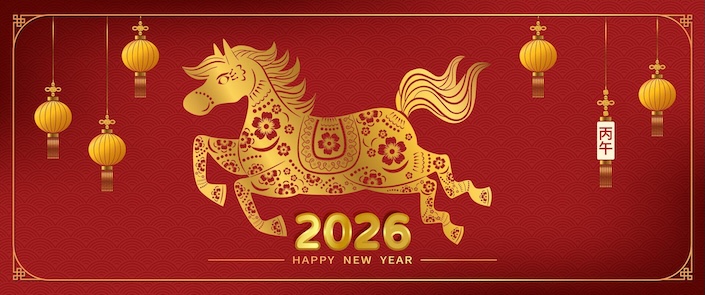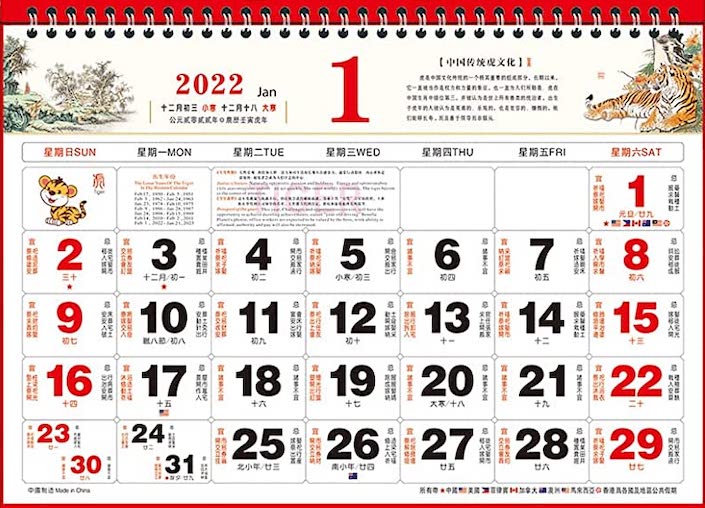The Ox's Journey: Unlocking Mysteries of the Year of the Ox


Learn Chinese in China or on Zoom and gain fluency in Chinese!
Join CLI and learn Chinese with your personal team of Mandarin teachers online or in person at the CLI Center in Guilin, China.
Many people believe that the Chinese zodiac year in which you were born influences many important aspects of life, from personality to romantic partners. Read on to discover the many fascinating traditions associated with the Year of the Ox!


Table of Contents
When is the Year of the Ox ?
The Chinese Calendar operates on a 12-year cycle, with each year marking a new zodiac sign.
Although every new year in the West starts on January 1st and ends on December 31st according to the Gregorian calendar, the start and end dates for the Chinese New Year fluctuate every year due to the fact that they are calculated using the traditional Chinese lunisolar calendar.
In 2021, the Chinese New Year begins on February 12, 2021 and ends on January 31, 2022. According to Chinese tradition, this time period constitutes the Year of the Ox.
The year in which one is born traditionally determines one’s zodiac sign. Thus, those born this year as well as those born in 1937, 1949, 1961, 1973, 1985, 1997, 2009 and 2021 are all said to have been born in the Year of the Ox.


If you were born in 1937, 1949, 1961, 1973, 1985, 1997, 2009 or 2021, you were born in the Year of the Ox!
The year of the Metal Ox
But wait, there’s more. Not only is 2021 the Year of the Ox. It’s also the Year of the Metal Ox. Not sure what that means? Not to worry! The Chinese traditional calendar is complex and digging into its inner workings can get confusing.
In short, on a larger scale the Chinese lunar calendar operates on a sexagenary (60-year) cycle which consists of 10 heavenly stems (干 gàn) and 12 earthly branches (支 zhī).
These in total can create 60 stem-branch combinations. Each of these combinations is assigned to one of the five elements (fire, water, wood, metal and earth).
The Year of the Ox 2021-2022 falls on the 38th year of this sexagenary cycle, marking the 辛丑 (xīnchǒu) stem-branch combination, which represents Yin Metal.
The Ox in Chinese language and culture
In Chinese, what we call "the Year of the Ox" in English is actually called 牛年 (Niúnián). Confusingly, the character 牛 (niú) is most commonly translated into English as "cow," not "ox."
The Year of the Ox, not Cow!
It's unclear why 牛年 (Niúnián) is most commonly referred to as the "Year of the Ox" instead of the "Year of the Cow." Most probably, it has something to do with the fact that the Chinese character 牛 (niú) can in fact be used for various different types of bovines.
While cattle, oxen, water buffalo and bulls are technically different animals, the character 牛 (niú) can actually refer to them all. While the most accurate translation of 牛年 (Niúnián) might actually be "Year of the Bovine," "Year of the Ox" sounds a bit more poetic.
It's good to be an Ox
Throughout history, oxen and related animals like water buffalo have been used in farming, for transport and even in the military. They are relatively low-maintenance, grazing on grass and providing milk.
They endlessly contribute and never ask for any rewards for helping with the harvest. Therefore, these animals are seen as being full of strength and considered to be the backbone of many agricultural societies.
In traditional Chinese culture, oxen and other bovines are true representatives of hard work and diligence, capable of enduring many hardships.
These positive connotations can be found reflected in the language. For example, in China, you will often hear the phrase 你很牛 (nǐ hěn niú; “you are very ox”). This phrase sounds strange in translation, but it is actually used as a compliment meaning that you are really great or really cool!


The Chinese character 牛 can actually refer to a variety of different bovines, not just oxen.
The Great Race and the origins of the Year of the Ox
If you are in any way familiar with the Chinese zodiac signs, you will have heard of The Great Race, which is one of several stories used to explain the origins of the Chinese zodiac.
According to legend, it all started when the Jade Emperor declared that the first 12 animals to cross to the other side of a mighty river would have a year named after them.
In some ways, the Ox was the true winner of the race, but his title was stolen from him by the Rat, who hid in the Ox's ear and jumped from the Ox's back after they had crossed the river. This trick allowed the Rat to cross the finish line first, forever relegating the Ox to second place in the eternal zodiac rotation.


According to legend, the ox came in second after the rat cheated during a race organized by the Jade Emperor. Image Credit: D.h.Isais
Ox personality traits
People born in the Year of the Ox are believed to inherit the personality traits that are traditionally associated with the animal. Thus, those born in the Year of the Ox are considered to be strong, reliable, fair and conscientious.
They are also tranquil, patient, and can be trusted due to their honesty. They represent diligence, stability and integrity. Those born under this zodiac sign are thought to be down to earth and unemotional.
Each Chinese zodiac has both good and bad sides, and the Year of the Ox is no different.
In this case, the Ox’s supposedly down-to-earth nature means that those with this sign can be slow and indifferent, as feelings alone can rarely change their minds. Since they believe strongly in themselves, they are also stubborn, uncompromising, and hate to fail or be challenged. They say little but can be very opinionated.


Those born in the Year of the Ox are said to be reliable, diligent and honest.
Compatibility with other signs
The most compatible signs with the Ox are the Snake, Rooster, and surprisingly, the Rat! This is because all of these signs are complementary to each other in intellect and habits, sharing the tendency to be goal orientated and conscious about attaining their objectives. They are considered deep thinkers and also share the same slowness in calculated decision making.
The Ox is least compatible with the Tiger, Dragon, Horse and Goat.
The Tiger can manipulate the Ox to comply with its wishes. The Dragon is usually boisterous and likes showing off, which clashes with the Ox’s humble demeanor. Since each of them always want to take the lead, quarrels are inevitable.
The Horse is just as stubborn as the Ox, causing inflexibility and lack of communication. Likewise, the quick temper of the Ox can conflict with the inconsiderate nature of the Goat, causing tempers to flare and sparking arguments.


Those born in the Year of the Ox are said to be most compatible with individuals born in the Year of the Snake, Rooster and Rat.
The unlucky 本命年 (běnmìngnián)
The Year of the Ox is the Ox zodiac sign’s 本命年 (běnmìngnián), which roughly translates to “natal year.” As the name suggests, this marks the time when a person has finished passing through another 12-year zodiac cycle and has again reached his or her own zodiac year.
If you were born in an Ox year, every subsequent Year of the Ox is your 本命年 (běnmìngnián).
In general, a person born under the Ox zodiac sign is believed to have a life of labor and hard work ahead of them. But as long as those with this sign stay true to themselves and utilize their strengths, they will eventually reap the rewards of their hard work. By relying on continuous effort, they will succeed and achieve their goals.
View this post on Instagram
Offending Tai Sui and bad luck
In Chinese astrology, Tai Sui (太岁 or tàisuì), also called the God of the Year, is thought to bring misfortune to people in the zodiac year matching the year of their birth. Therefore, one’s 本命年 (běnmìngnián) is considered unlucky – a year of hardships and difficulties.
The deity Tai Sui originated as the personification of a collection of stars opposite the planet Jupiter which orbit the earth every 12 years. “Offending” the Tai Sui is thought to mean that one’s energy field is affected by the unstable energy of Jupiter.


Traditionally, Chinese people believe that a deity known as Tai Sui brings bad luck to people during the years that correspond to their zodiac signs. Image credit: Candyji
As is the case with Western astrology, Chinese astrologers and fortune tellers sometimes create horoscopes for the various zodiac signs such as this horoscope (link in Chinese) aimed at those born under the sign of the Ox for whom 2021 is a 本命年 (běnmìngnián).
Examining such horoscopes makes it clear that one’s 本命年 (běnmìngnián) is considered an unlucky time when it’s best to proceed with caution.
According to the example Chinese language horoscope mentioned above, in the Year of the Ox, people with the Ox zodiac sign are expected to have an unstable year, with some financial strains and turmoil in love and relationships.
In 2021, although those born under the sign of the Ox should expect good luck in their career, the overall situation will be negative. Those born in the Year of the Ox will be prone to making mistakes and will have difficulty concentrating at work, causing workplace tension and dissatisfaction among their employers.
Furthermore, in the area of relationships, single people born under the sign of the Ox should refrain from confessing their love to potential partners, as rejection will be inevitable.
According to this example of a Chinese horoscope, it’s safe to conclude that those born in the Year of the Ox should spend 2021 focusing on self-development and prioritizing health.
Remedies
One of the ways to ward off bad luck during your 本命年 (běnmìngnián) is to wear the color red (more notably, red underwear!). The color red is considered auspicious and believed to repel evil.
Wearing a 貔貅 (píxiū) amulet is another way to invite good fortune. These amulets feature an auspicious creature which resembles a lion. They can be worn as jewelry, or simply put around the house to provide protection.


If you were born in the Year of the Ox, wearing red during Ox years will help you ward off bad luck.
Ready to celebrate?
Celebrating the Chinese Year of the Ox is a great time to encourage ourselves to live lives that reflect some of the best personality characteristics displayed by those with the Ox sign such as steadfastness, resilience and diligence.
The Chinese New Year is an incredibly important holiday that’s traditionally spent with family and friends. This holiday is celebrated in China and all over the world by members of the Chinese diaspora and foreigners alike. So why not use this opportunity to learn some Chinese New Year greetings, or give a loved one a meaningful gift?
On behalf of the CLI team, we wish you all a happy Year of the Ox!
祝大家新年快乐 —— 牛年大吉, 财源滚滚!!


Chinese New Year is one of the most important holidays in Chinese culture.
Year of the Ox Vocabulary
| Chinese | Pinyin | English |
|---|---|---|
| 属牛 | shǔ niú | to be of the Ox zodiac sign |
| 生肖 | shēngxiào | zodiac animal |
| 优点 | yōudiǎn | advantages / strengths |
| 用功 | yònggōng | diligent |
| 努力 | nǔlì | hard working |
| 老成 | lǎochéng | mature/steady |
| 稳健 | wěnjiàn | steady/stable |
| 踏实 | tàshí | practical |
| 缺点 | quēdiǎn | disadvantage / shortcoming |
| 牛脾气 | niúpíqì | "bull tempered"/stubborn |
| 自负自大 | zìfù zìdà | arrogant |
| 太岁 | tàisuì | Tai Sui (God of the Year/Grand Duke Jupiter) |
| 农历 | nóngli | Chinese lunisolar calendar |
| 运势 | yùnshì | fortune |
| 貔貅 | píxiū | a legendary Chinese creature |
| 本命年 | běnmìngnián | natal year |


Tania Yeromiyan is the Marketing Manager at the Chinese Language Institute (CLI). She holds a BA in Arabic and Chinese with First Class Honours from the University of Leeds, where she spent two years studying abroad in Taiwan and Egypt. Tania studied Beijing Opera at the Shanghai Theatre Academy and placed third in the UK's 14th "Chinese Bridge" Language Proficiency Competition. Before her current role, she served as CLI's Admissions Manager for five years, working with thousands of students preparing to study Chinese in China. She is fluent in Chinese and travels to China annually.














